|
|
|
Sort Order |
|
|
|
Items / Page
|
|
|
|
|
|
|
| Srl | Item |
| 1 |
ID:
185819
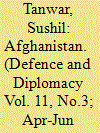

|
|
|
| 2 |
ID:
177073
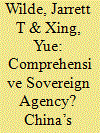

|
|
|
|
|
| Summary/Abstract |
This article investigates the confluence of China’s rise and International Recognition Theory through a quantitative content analysis of 166 joint statements on state visits between China’s heads of state and the representatives of 80 partners. China’s partnership diplomacy is a continuous, comprehensive, and dynamic diplomatic strategy for the 21st century. Yet, extraordinarily little research has explored the substance of China’s partnerships and the international experience that they offer. To investigate these dimensions, this article develops a typology of international recognition within which to situate China’s partnership diplomacy. We find that partnership documents exhibit a gradation of sovereign recognition that is transformed into “Comprehensive Sovereign Agency”: a type of sovereignty with Chinese characteristics that establishes the agency of the Chinese government over the comprehensive spectrum of China’s foreign relations. In contrast to earlier international experiences that ground sovereign agency in the functions of security, China’s partnership diplomacy yields a network that emphasizes the productive (economic, scientific, and cultural) functions of state capacity and international interaction. China’s partnership diplomacy reproduces the bilateral relations of preference and solidarity that ground China’s regime legitimacy in economic development. Its partnerships operate outside of the liberal multilateral security communities that generate international affinity through a difference-blind multilateral framework, constituting instead a difference-sensitive bilateral framework that provides a source of international recognition and sovereign agency that circumvent the liberal international experience.
|
|
|
|
|
|
|
|
|
|
|
|
|
|
|
|
| 3 |
ID:
155672
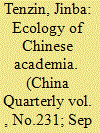

|
|
|
|
|
| Summary/Abstract |
While Chinese academic excellence is gaining increasing international recognition, plagiarism, corruption, nepotism and other negative practices are reportedly rampant in academia in China. Many point the finger at fundamental flaws within the tizhi, the highly structured Chinese socio-political system. I propose re-examining Chinese academia and its practices by applying and expanding Pierre Bourdieu's notion of field as this framework helps to identify the predicament of the “deep water” in which Chinese scholars and institutes find themselves. The four fields I outline – ideological, quasi-official, fame–profit and guanxi fields – spotlight academic practices with “Chinese characteristics.” I elaborate on my own experiences and reflections as both an insider and outsider to these practices, a position which I refer to as a third-eye perspective. I argue that despite the constraints of the “deep water,” the field-oriented angle of investigation reveals that the depths and types of “deep water” vary from one institute to another and also that the internally generated ongoing initiatives promise a step-by-step transformation in Chinese academia. To provoke further thought, I contend that the Chinese case is both a non-exception and alternative to the Western (and other) practices. In so doing, I call for a balanced perspective to re-examine Chinese academic ecology.
|
|
|
|
|
|
|
|
|
|
|
|
|
|
|
|
| 4 |
ID:
133275
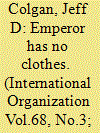

|
|
|
|
|
| Publication |
2014.
|
| Summary/Abstract |
Scholars have long debated the causal impact of international institutions such as the World Trade Organization or the International Monetary Fund. This study investigates Organization of Petroleum Exporting Countries (OPEC), an organization that purports to have significant influence over the market for the world's most important commodity-petroleum. Using four empirical tests, I find that OPEC has little or no impact on its members' production levels. These findings prompt the question of why so many people, including scholars, believe in OPEC's influence over the world's oil supply. The idea of OPEC as a cartel is a "rational myth" that supports the organization's true principal function, which is to generate political benefits for its members. One benefit it generates is international prestige. I test this idea using data on diplomatic representation and find that OPEC membership is associated with increased international recognition by other states. Overall, these findings help one to better understand international regimes and the process of ideational change in world politics.
|
|
|
|
|
|
|
|
|
|
|
|
|
|
|
|
| 5 |
ID:
146053
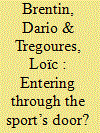

|
|
|
|
|
| Summary/Abstract |
In December 2014, the International Olympic Committee [IOC] granted full membership to Kosovo. For the young state, which had declared its independence only in 2008, this decision meant that it could take part in the upcoming 2016 Summer Olympic Games in Rio de Janeiro. This analysis illustrates the significance of Kosovo’s full IOC membership. Arguing that IOC membership can be identified as both the “end” and “beginning” of Kosovo’s diplomatic endeavour towards international recognition, the role of sport within this process is illuminated. It mirrors the strategic value of representative sport for a nation-building process as well as its particular significance for public diplomacy in Kosovo. Kosovar political elites shifted their focus towards sport because “traditional” diplomatic efforts, despite being successful to a certain extent, could not break the seemingly cemented status quo considering its United Nations [UN] status. Inclusion in the “Olympic family” represents more than just a symbolic victory for Kosovar diplomacy. The Kosovar nation-building and -branding process, emblematised through the “soft power” of representative sport, could be increasingly used to create symbolic pressure on states that have not yet recognised Kosovo; its ultimate diplomatic goal remains to enter the UN, even if it has to be through “sport’s door.”
|
|
|
|
|
|
|
|
|
|
|
|
|
|
|
|
| 6 |
ID:
160887
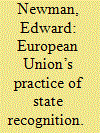

|
|
|
|
|
| Summary/Abstract |
This article explores the European Union’s (EU) practices of international state recognition in a transitional international order. It illustrates the difficulties that the EU has encountered in attempting to reach a collective position on sensitive cases of recognition – through a complex balance of internal and external considerations – at a time when the norms regarding recognition are increasingly under challenge. Whether the organisation takes a collective European position on recognition or allows its members to adopt individual national positions, acute inconsistencies and tensions have been exposed, with implications for the EU’s standing in the world. Through this, the article identifies a key tension between the EU’s normative commitments and its geopolitical interests. In conclusion, the article argues that while a uniform EU policy on recognition may not be feasible and case-by-case pragmatism will likely continue, a more coherent approach and greater understanding of the impact of the EU’s position on recognition are necessary. The article draws upon interview material and extensive analysis of official EU documentation in order to provide new insights into this complex challenge. By exploring the intricacies of recognition politics, the article also makes an empirical contribution to understanding the practice of international relations in this area.
|
|
|
|
|
|
|
|
|
|
|
|
|
|
|
|
| 7 |
ID:
161212
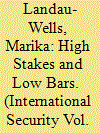

|
|
|
|
|
| Summary/Abstract |
When rebel groups engage incumbent governments in war for control of the state, questions of international recognition arise. International recognition determines which combatants can draw on state assets, receive overt military aid, and borrow as sovereigns—all of which can have profound consequences for the military balance during civil war. How do third-party states and international organizations determine whom to treat as a state's official government during civil war? Data from the sixty-one center-seeking wars initiated from 1945 to 2014 indicate that military victory is not a prerequisite for recognition. Instead, states generally rely on a simple test: control of the capital city. Seizing the capital does not foreshadow military victory. Civil wars often continue for many years after rebels take control and receive recognition. While geopolitical and economic motives outweigh the capital control test in a small number of important cases, combatants appear to anticipate that holding the capital will be sufficient for recognition. This expectation generates perverse incentives. In effect, the international community rewards combatants for capturing or holding, by any means necessary, an area with high concentrations of critical infrastructure and civilians. In the majority of cases where rebels contest the capital, more than half of its infrastructure is damaged or the majority of civilians are displaced (or both), likely fueling long-term state weakness.
|
|
|
|
|
|
|
|
|
|
|
|
|
|
|
|
| 8 |
ID:
140567
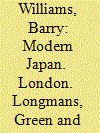

|
|
|
|
|
| Publication |
London, Longmans, Green and Co. Ltd, 1969.
|
| Description |
x, 150p.pbk
|
| Series |
Modern Times
|
|
|
|
|
|
|
|
|
|
|
|
Copies: C:1/I:0,R:0,Q:0
Circulation
| Accession# | Call# | Current Location | Status | Policy | Location |
| 003980 | 952/WIL 003980 | Main | On Shelf | General | |
|
|
|
|
| 9 |
ID:
140416
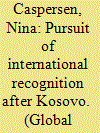

|
|
|
|
|
| Summary/Abstract |
The international recognition of Kosovo exacerbated existing uncertainties over state recognition. By its supporters it was billed as a “unique case,” but others saw it as extending the right to self-determination. Unlike most literature on state recognition, this article adopts a bottom-up approach and analyzes how other aspiring states have reacted to the new politics of recognition. Drawing on the legitimation strategies observed in five de facto states since 2008, it argues that separatist strategies are not simply shaped by changes in the practice and norms of state recognition. They are constrained, both internally and externally. While there is greater divergence in official strategies since 2008 and a greater emphasis on international engagement, the substance of the strategies is much more homogenous and demonstrates a great deal of continuity.
|
|
|
|
|
|
|
|
|
|
|
|
|
|
|
|
| 10 |
ID:
172021
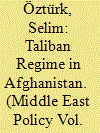

|
|
|
|
|
| Summary/Abstract |
The Taliban sat at the negotiating table with the Afghan opposition in Moscow in February 2019. Although Ashraf Ghani, the current president of the country, refused to be there and criticized the negotiations, the Taliban and the current regime's opposition — including Hamid Karzai — made important decisions on bringing peace and stability to Afghanistan. If the negotiations conclude as expected, the most important outcome would be for the Taliban to continue as a legitimate actor in Afghan politics. The basic issues between the two sides are for American soldiers to withdraw from Afghan soil and for the Taliban to cease hosting terror groups like al‐Qaeda. While the Taliban seemed to soften its radical views on women's rights, it demanded a release of prisoners and the removal of Taliban members from the sanctions lists.
|
|
|
|
|
|
|
|
|
|
|
|
|
|
|
|
| 11 |
ID:
114099
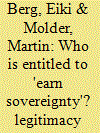

|
|
|
|
|
| Publication |
2012.
|
| Summary/Abstract |
Abkhazia and Nagorno-Karabakh are internationally unrecognised political entities, or so-called de facto states, that have emerged as a result of the incomplete and contested state-formation of their parent states and of the secessionist movements that emerged in the power vacuum of the post-Soviet space. In addition to examining the conventional reliance on the self-determination principle, usually followed by a call for international recognition (as often practised by emerging sovereigns), this article aims to survey whether these political entities have proved that they embody 'rightful authority' as such and whether they 'have earned their sovereignty'. In other words, it attempts to examine the self-determination claims in Abkhazia and Nagorno-Karabakh based on legitimacy criteria that are widely accepted for liberal democratic societies using an analysis of the respective issues as they were represented in focus-group discussions in these two regions.
|
|
|
|
|
|
|
|
|
|
|
|
|
|
|
|
|
|
|
|
|